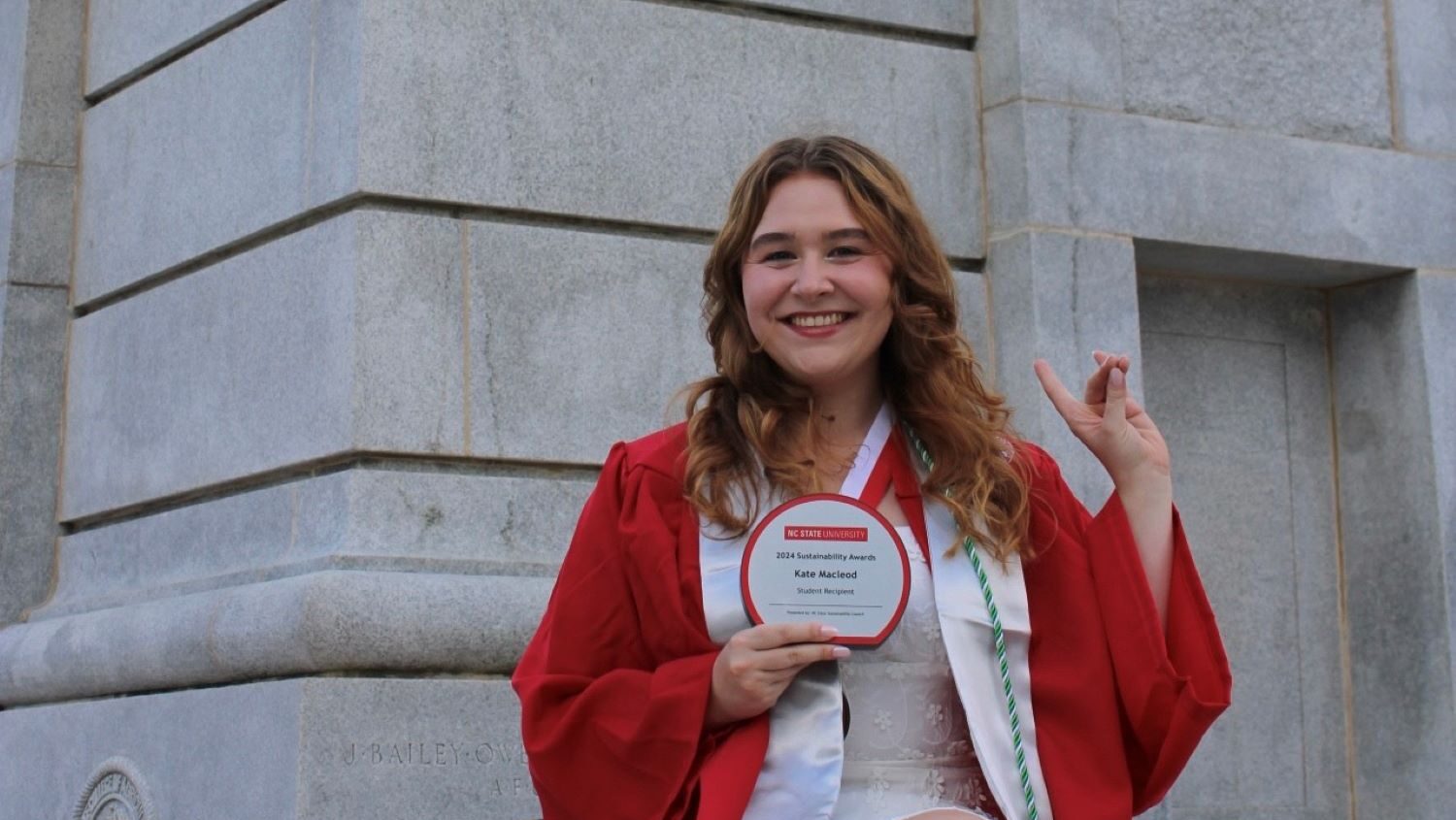Kate Macleod Recognized as Student Recipient of 2024 Sustainability Award

We are proud to announce that Kate Macleod, a recent alumna of the Sustainable Materials and Technology program, has been honored as the student recipient of the 2024 Sustainability Award! This prestigious award recognizes individuals for their outstanding achievements in promoting sustainability on campus, within the community, or globally. Kate is highly deserving of this recognition due to her unwavering dedication to sustainability initiatives both on and off campus.
During her time at NC State, Kate has made significant contributions as a Zero Waste Intern with NC State’s Waste Reduction and Recycling office. She has also worked with the local nonprofit Toward Zero Waste and supported the student organization Zero Waste Wolves. Furthermore, Kate is a founding member of the Sustainable Materials and Technology Student Association (SMTSA) and has served as its vice president.
Learn more about Kate and her passion for sustainability below!
Can you remember what initially sparked your interest in sustainability?
My initial interest in sustainability began during my 9th grade environmental science class. I remember learning more about solar panels and other renewable energy sources and being so confused. If we had all of these potential solutions to help our planet, why weren’t we using them? As I continued my time in high school, I was exposed to more ways in which we were failing our planet, particularly all of the single-use plastics we consume and send to the landfill. At that point, I decided I wanted to do something about it which led me to finding the Sustainable Materials and Technology program.
Explain what a Zero Waste Intern does to someone who is unfamiliar with the position.
Zero Waste Interns work to educate and engage the campus community about the Waste Reduction and Recycling Office’s projects and programs. We start the year off managing the Zero Waste Wolfpack program at Carter Finley Football Stadium. This program’s purpose is to help fans sort their trash correctly and contribute to making Carter Finley more sustainable. In the spring semester, we focus more on campus engagement like tabling at events, doing educational sessions to different groups, and assisting with the student organization, The Zero Waste Wolves.
Outside of your internship, what other ways have you contributed to sustainability for NC State University and the broader community?
Outside of my internship with the Waste Reduction and Recycling Office, I also had an internship working for a non-profit called Toward Zero Waste. The mission of Toward Zero Waste is to educate Wake County residents about living a low-waste lifestyle and advocating for improved sustainability infrastructure. I started as a volunteer helping with whatever they needed then ended up building my own internship for sustainability outreach and engagement. This internship is all Raleigh/local community focused and through this opportunity, I have gained a lot of event planning and project management experience.
What is an initiative you wish you could have started at NC State that you hope to see implemented by future interns?
I would have loved to create a stronger partnership with the athletics department to help educate fans. Working with the Zero Waste Wolfpack program, I think there are so many ways that we could be promoting sustainability at our football games and tailgates. I see opportunities to set up fun and engaging tailgating activities or on screen ads to drive-up diversion/education. I would also love to see more information about hosting sustainable tailgates be sent out to fans before games.
Additionally, I hope to see reusable items implemented on campus. A lot of people tend to forget that “reduce and reuse” comes before “recycle”, so it is important and the best for the environment that we try to find options for reuse before looking at recyclable or compostable items. For example, before the pandemic, there was a collaboration between Dining and the University Activities Board to give out reusable cups to students that would give them a discount on fountain drinks in places like Talley or the Atrium. I hope something like this come back and eventually be applied to our campus coffee shops, since all plastic cups are not recyclable here in Raleigh.
What are ways you encourage others to promote sustainability in their daily lives?
The main way I encourage others to promote sustainability in their lives is by starting small. I think a lot of people feel alienated from sustainability because they see it as having to go all or nothing or having to make huge drastic lifestyle changes. This is not the case. It can start as small as making sure you are always putting aluminum cans in the recycling bin or make using reusable shopping bags a habit. I love to remind everyone that this one small action may not feel like it’s making a difference but if a million people make one small change, that has a huge impact.
I also remind students that there is no better place to begin their sustainability journey than here at NC State. We offer exceptional resources, such as our on-campus composting facility and infrastructure that allows students to divert their food scraps. Students can engage in fantastic club initiatives, from creating pollinator gardens to protecting turtles. Additionally, they have opportunities to pursue their own interests through the Sustainability Fund and Make-a-thon. Now is the perfect time to start building lifelong habits and passions that benefit our environment!
How do you see sustainability being incorporated into your future career?
I hope my career looks like my last two years at NC State. I want to continue working in the realm of sustainability outreach and engagement. This would involve creating new programs, projects, events that expand resources and access for others to be more sustainable as well as encouraging people to use these new programs. I hope to continue contributing to solutions for making our society more aware of what and how we are consuming.